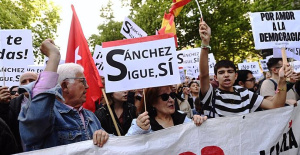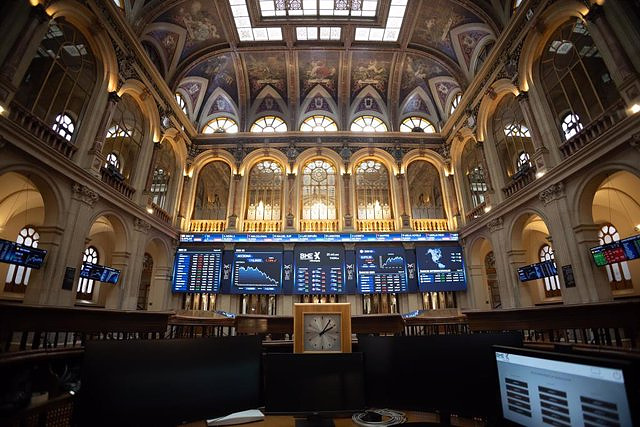MADRID, 10 Nov. (EUROPA PRESS) -
The Ibex 35, the main indicator of the Spanish market, has had its second positive week by closing with an increase of 0.84%, which has allowed it to finish at the edge of 9,400 points, a level at which it managed to finish in the yesterday and which had not been seen since the end of September.
The selective consolidates the strong advances of last week - then it rose 4.19%, the best weekly figure since last March - in one that has been marked by the trickle of results typical of the end of the season business results, the few macroeconomic references and the statements of central bankers in different forums.
Thus, the Ibex has managed to recover all the ground lost after the six weeks of closures with falls since the end of September and throughout October - in that period it lost up to 6.6% and stood at 8,900 integers -, in such a way which, so far this year, has registered a cumulative advance of 13.88%.
The markets have ended the week conditioned by the statements of the central banks: on the one hand, the president of the Federal Reserve (Fed) of the United States, Jerome Powell, stated yesterday that perhaps monetary policy is not yet sufficiently tense, awakening new fears of a rate hike.
"Although the market grants a minimum probability of an additional increase of 25 basis points, everything continues to point to high rates for a long time," analysts at Renta 4 have pointed out in a market report, while those at Banca March have pointed out that, despite this speech, "the rate pause is now a reality" and fixed income remains, in his opinion, the asset with the best return-risk ratio.
Furthermore, this afternoon it was learned in the United States that 12-month inflation expectations have risen to their highest levels in the last year, according to the University of Michigan consumer confidence index prepared for November.
For her part, the head of the European Central Bank (ECB), Christine Lagarde, reiterated this Friday that if interest rates are maintained at their current levels of 4.50% for a "sufficient" time, the inflation rate will return. to 2% that defines price stability, although it has recognized that prices could rebound in the coming months due to the extinction of the energy base effect.
On the side of the 'macro' agenda, in these five days the services PMIs have stood out, which, for Spain, have shown an acceleration in October for the second consecutive month, while in the eurozone the sector has deteriorated again. Also in the eurozone, it has been published that retail sales in the eurozone fell 0.3% in September, one tenth more than expected, in a monthly rate.
At the same time, confirmation has reached the market in second reading that German inflation stood at 3.8% in October, which represents seven tenths less than the 4.5% in September and the lowest year-on-year increase in prices since August 2021.
For its part, in the United Kingdom the GDP has shown that the British economy did not experience any growth between July and September compared to the previous three months as a consequence, mainly, of the contraction of activity in services. However, compared to the third quarter of 2022, the economy grew by 0.6%.
Regarding the business world - and beyond the publication of accounts of companies such as Telefónica, Amadeus, Colonial or Cellnex - Telefónica has stood out after having launched last Tuesday a voluntary public takeover bid (OPA) on shares representing a maximum of 28.19% of the share capital and voting rights of its German subsidiary, Telefónica Deutschland, of which it currently owns, directly or indirectly, 71.81%. The amount of the operation would be around 1,970 million.
Given this situation, in the weekly count, the advances of Amadeus (6.81%), Indra (4.64%) have stood out; Rovi (3.78%); Banco Sabadell (2.84%), Inditex (2.21%), BBVA (2.15%) and Caixabank (1.85%).
On the other hand, the worst weekly evolution has been led by ArcelorMittal (-6.39%), Colonial (-5.45%), Solaria (-4.9%) and Acciona Energía (-3.77%).
European stock markets ended the week in a mixed manner: Frankfurt rose 0.3% while Paris lost 0.03%; Milan 0.59% and London 0.77%. For its part, the Dow Jones, a Wall Street indicator, provisionally remained at the same level as last Friday's close (the S
In the raw materials market, Brent crude oil, the reference for the Old Continent, fell around 4%, to 81.5 dollars a barrel, while the Texas WTI barrel lost 4.1%, to 77. 2 dollars a barrel. In that sense, the price of both fell, respectively, to the levels of August and July, leaving behind the increases of October due to the outbreak of the Palestinian-Israeli conflict.
In the currency market, the euro fell 0.53% compared to the "greenback" in the week, to 1.0674 dollars, while the interest on the long-term Spanish bond closed at 3.758% after adding seven points basics and with the risk premium (the differential with the German bond) at 104.4 points.
The markets will focus, for next week, on the economic forecasts, GDP, inflation and employment data of the European Union (EU), as well as the final inflationary data in October of its main economies, while that consumer confidence (ZEW) for November in Germany will also be known.
Inflationary readings in October from the United States will also be known, as well as retail sales, while raw materials markets will pivot on the monthly reports from the OPEC alliance and the International Energy Agency (IEA), as well as inventories of countries like the United States itself.

 Exploring Cardano: Inner Workings and Advantages of this Cryptocurrency
Exploring Cardano: Inner Workings and Advantages of this Cryptocurrency Seville.- Economy.- Innova.- STSA inaugurates its new painting and sealing hangar in San Pablo, for 18 million
Seville.- Economy.- Innova.- STSA inaugurates its new painting and sealing hangar in San Pablo, for 18 million Innova.- More than 300 volunteers join the Andalucía Compromiso Digital network in one month to facilitate access to ICT
Innova.- More than 300 volunteers join the Andalucía Compromiso Digital network in one month to facilitate access to ICT Innova.-AMP.- Ayesa acquires 51% of Sadiel, which will create new technological engineering products and expand markets
Innova.-AMP.- Ayesa acquires 51% of Sadiel, which will create new technological engineering products and expand markets Unicaja lifts its first FIBA Champions League at the expense of Lenovo Tenerife
Unicaja lifts its first FIBA Champions League at the expense of Lenovo Tenerife Abascal (Vox) criticizes that Sánchez is "victimizing" himself and calls for elections after his possible resignation
Abascal (Vox) criticizes that Sánchez is "victimizing" himself and calls for elections after his possible resignation Carlos Alcaraz reaches the round of 16 in Madrid without breaking a sweat
Carlos Alcaraz reaches the round of 16 in Madrid without breaking a sweat Some 5,000 people demonstrate in front of Congress for democracy, hours before Sánchez's decision
Some 5,000 people demonstrate in front of Congress for democracy, hours before Sánchez's decision How Blockchain in being used to shape the future
How Blockchain in being used to shape the future Not just BTC and ETH: Here Are Some More Interesting Coins Worth Focusing on
Not just BTC and ETH: Here Are Some More Interesting Coins Worth Focusing on UPV students build a prototype of a wooden house to move to Equatorial Guinea
UPV students build a prototype of a wooden house to move to Equatorial Guinea The UA opens the call for the Impulso 2024 Awards for the best innovative business initiatives
The UA opens the call for the Impulso 2024 Awards for the best innovative business initiatives ALI, virtual assistant from Alicante, internationally recognized by the OECD
ALI, virtual assistant from Alicante, internationally recognized by the OECD Retrópolis brings the golden age of video games and computing to the UPV
Retrópolis brings the golden age of video games and computing to the UPV A million people demonstrate in France against Macron's pension reform
A million people demonstrate in France against Macron's pension reform Russia launches several missiles against "critical infrastructure" in the city of Zaporizhia
Russia launches several missiles against "critical infrastructure" in the city of Zaporizhia A "procession" remembers the dead of the Calabria shipwreck as bodies continue to wash up on the shore
A "procession" remembers the dead of the Calabria shipwreck as bodies continue to wash up on the shore Prison sentences handed down for three prominent Hong Kong pro-democracy activists
Prison sentences handed down for three prominent Hong Kong pro-democracy activists ETH continues to leave trading platforms, Ethereum balance on exchanges lowest in 3 years
ETH continues to leave trading platforms, Ethereum balance on exchanges lowest in 3 years Investors invest $450 million in Consensys, Ethereum incubator now valued at $7 billion
Investors invest $450 million in Consensys, Ethereum incubator now valued at $7 billion Alchemy Integrates Ethereum L2 Product Starknet to Enhance Web3 Scalability at a Price 100x Lower Than L1 Fees
Alchemy Integrates Ethereum L2 Product Starknet to Enhance Web3 Scalability at a Price 100x Lower Than L1 Fees Mining Report: Bitcoin's Electricity Consumption Declines by 25% in Q1 2022
Mining Report: Bitcoin's Electricity Consumption Declines by 25% in Q1 2022 Oil-to-Bitcoin Mining Firm Crusoe Energy Systems Raised $505 Million
Oil-to-Bitcoin Mining Firm Crusoe Energy Systems Raised $505 Million Microbt reveals the latest Bitcoin mining rigs -- Machines produce up to 126 TH/s with custom 5nm chip design
Microbt reveals the latest Bitcoin mining rigs -- Machines produce up to 126 TH/s with custom 5nm chip design Bitcoin's Mining Difficulty Hits a Lifetime High, With More Than 90% of BTC Supply Issued
Bitcoin's Mining Difficulty Hits a Lifetime High, With More Than 90% of BTC Supply Issued The Biggest Movers are Near, EOS, and RUNE during Friday's Selloff
The Biggest Movers are Near, EOS, and RUNE during Friday's Selloff Global Markets Spooked by a Hawkish Fed and Covid, Stocks and Crypto Gain After Musk Buys Twitter
Global Markets Spooked by a Hawkish Fed and Covid, Stocks and Crypto Gain After Musk Buys Twitter Bitso to offset carbon emissions from the Trading Platform's ERC20, ETH, and BTC Transactions
Bitso to offset carbon emissions from the Trading Platform's ERC20, ETH, and BTC Transactions Draftkings Announces 2022 College Hoops NFT Selection for March Madness
Draftkings Announces 2022 College Hoops NFT Selection for March Madness























